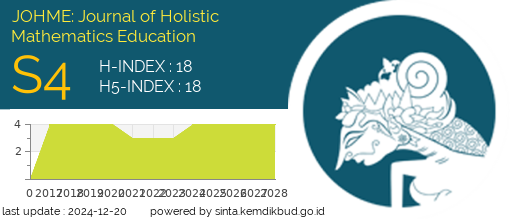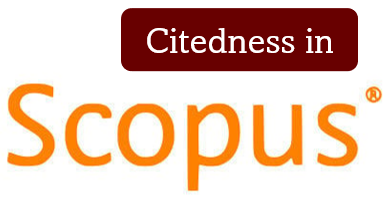THE IMPLEMENTATION OF THE PROBLEM-BASED LEARNING METHOD TO ENHANCE GRADE 7 STUDENTS’ CRITICAL THINKING SKILLS IN LEARNING MATHEMATICS AT SMP HOLLAND VILLAGE MANADO
DOI:
https://doi.org/10.19166/johme.v3i1.994Λέξεις-κλειδιά:
problem-based learning, critical thinking skills, school mathematics, keterampilan berpikir kritis, matematika sekolahΠερίληψη
Critical thinking is one of the most important issues in education. However, based on field observation results it is found that students have low critical thinking skills. One reason is that learning activities in the classroom do not foster students’ critical thinking skills. The purpose of this research study to enhance students’ critical skills by implementing the Problem-based Learning (PBL) method. The research subjects were 29 grade 7 students in a junior high school in Manado. The research method used was Classroom Action Research (CAR), conducted from September 12 to November 3, 2017. The instruments used were diagnostic tests, pre-tests and post-tests, observation sheets, student interviews, checklists by observers and students, and the researcher’s reflection journal. Data results were analyzed using the descriptive qualitative method. The results showed that the implementation of the PBL method was able to enhance students’ critical thinking skills in learning math with the achievement percentage of students who passed the KKM for pre-test and post-test based on the overall data analysis result from cycle one to two showing an enhancement of 22% on the first indicator, 9% on the third indicator, and 2% on the fourth indicator. The second indicator showed no enhancement amd there was a decrease of 8% on the fifth indicator. Therefore, the PBL method is effective in enhancing students’ critical thinking skills through each stage of the method in the learning process.
BAHASA INDONESIA ABSTRACT: Kemampuan berpikir kritis adalah salah satu hal terpenting dalam dunia pendidikan. Namun, berdasarkan observasi di lapangan ditemukan bahwa siswa memiliki keterampilan berpikir kritis yang rendah. Salah satu penyebabnya adalah aktivitas pembelajaran di kelas tidak melatih keterampilan berpikir kritis siswa. Adapun tujuan dari penelitian ini untuk meningkatkan keterampilan berpikir kritis siswa menggunakan metode Problem-based Learning (PBL). Subyek penelitian adalah 29 siswa kelas VII di suatu SMP di Manado. Metode penelitian yang digunakan adalah Penelitian Tindakan Kelas (PTK), dilakukan dari September sampai dengan November 2017. Instrumen yang digunakan adalah diagnostic test, pre-test dan post-test, lembar observasi, wawancara siswa, checklistoleh pengamat dan siswa, dan jurnal refleksi peneliti. Analisis data hasil penelitian menggunakan metode deskriptif kualitatif. Hasil penelitian menunjukkan bahwa penerapan metode PBL mampu meningkatkan keterampilan berpikir kritis siswa dalam pembelajaran matematika dengan peningkatan indikator satu sebesar 22%, indikator tiga sebesar 9%, dan indikator empat sebesar 2%. Adapun untuk indikator dua tidak mengalami peningkatan dan indikator lima mengalami penurunan sebesar 8%. Dengan demikian, metode PBL terbukti efektif meningkatkan keterampilan berpikir kritis siswa melalui setiap tahapan metode dalam proses pembelajaran.
Αναφορές
Anugraheni, I. (2018). Meta analisis model pembelajaran problem based learning dalam meningkatkan keterampilan berpikir kritis di sekolah dasar. Polyglot: Jurnal Ilmiah, 14(1), 9-18. https://dx.doi.org/10.19166/pji.v14i1.789
Arends, R. (2008). Learning to teach: Belajar untuk mengajar. Yogyakarta, Indonesia: Pustaka Belajar.
Aziz, A., Ahyan, S., & Fauzi, L. M. (2016). Implementasi model problem based learning (PBL) dalam meningkatkan kemampuan berpikir kritis mahasiwa melalui lesson study. Jurnal Elemen, 2(1), 83-91. https://doi.org/10.29408/jel.v2i1.179
Che, F. S. (2002). Teaching critical thinking skills in a Hong Kong secondary school. Asia Pacific Education Review, 3(1), 83-91. https://doi.org/10.1007/bf03024923
Chrismastianto, I. (2015). Transformative learning: Upaya meningkatkan kemampuan berpikir kreatif siswa melalui pembelajaran berbasis masalah. Jurnal Pendidikan Dompet Dhuafa, 5(2), 1-12. Retrieved from https://jurnal.makmalpendidikan.net/index.php/JPD/article/view/78
Ennis, R. H. (1996). Critical thinking. Upper Saddle River, NJ: Prentice Hall.
Erickson, M. J. (2007). Christian theology. Grand Rapids, MI: Baker Book House.
Fisher, A. (2009). Critical thinking: An introduction. Cambridge: Cambridge University Press.
Kemendikbud. (2016). Peraturan menteri pendidikan dan kebudayaan republik indonesia nomor 21 tahun 2016 tentang standar isi pendidikan dasar dan menengah. Retrieved November 23, 2017, from https://luk.staff.ugm.ac.id/atur/bsnp/Permendikbud21-2016SIDikdasmen.pdf
Lestari, K., & Yudhanegara, M. (2015). Penelitian pendidikan matematika. Karawang, Indonesia: PT Refika Aditama.
Normaya & Karim. (2015). Kemampuan berpikir kritis siswa dalam pembelajaran matematika dengan menggunakan model Jucama di sekolah menengah pertama. EDU-MAT Jurnal Pendidikan Matematika, 3(1), 92-104. https://doi.org/10.20527/edumat.v3i1.634
Paul, R., & Elder, L. (2005). A guide for educators to critical thinking competency standards: Standards, principles, performance indicators, and outcomes with a critical thinking master rubric. Dillon, CA: Foundation for Critical Thinking.
Putri, S. A., Rinanto, Y., & Marjono. (2015). Penerapan model problem based learning (PBL) untuk meningkatkan kemampuan berpikir kritis siswa kelas X-4 SMA Negeri Kebakkramat tahun pelajaran 2014/2015. BIO-PEDAGOGI: Jurnal Pembelajaran Biologi, 4(2), 39-43. Retrieved from https://jurnal.uns.ac.id/pdg/article/view/5384
Saido, G. M., Siraj, S., Nordin, A. B., & Al_Amaedy, O. S. (2015). Higher order thinking skills among secondary school students in science learning. The Malaysian Online Journal of Educational Science, 3(3), 13-20 Retrieved from https://files.eric.ed.gov/fulltext/EJ1085914.pdf
Salim, A. H., Santosa, S., & Fatmawati, U. (2015). Penerapan problem based learning (PBL) untuk meningkatkan kemampuan berpikir kritis siswa kelas X MIPA 2 SMA Negeri 6 Surakarta tahun pelajaran 2014/2015. BIO-PEDAGOGI: Jurnal Pembelajaran Biologi, 4(2), 15-19. Retrieved from https://jurnal.uns.ac.id/pdg/article/view/5376
Sanjaya, W. (2008). Strategi pembelajaran berorientasi standar proses pendidikan. Jakarta, Indonesia: Prenada Media.
Schneider, V. (2002). Critical thinking in the elementary classroom: Problems and solutions. Educators Publishing Service. Retrieved from https://eps.schoolspecialty.com/EPS/media/Site-Resources/Downloads/articles/Critical_Thinking-Schneider.pdf
Simanjuntak, M. F., & Sudibjo, N. (2019). Meningkatkan keterampilan berpikir kritis dan kemampuan memecahkan masalah siswa melalui pembelajaran berbasis masalah. JOHME: Journal of Holistic Mathematics Education, 2(2), 108-118. https://doi.org/10.19166/johme.v2i2.1331
Tampubolon, S. (2014). Penelitian tindakan kelas sebagai pengembangan profesi pendidik dan keilmuan. Jakarta, Indonesia: Erlangga.
Tan, O. S., Baldwin, M. S., Beltran, R. O., Chernobilsky, E., DaCosta, M. C., Forrester, V., Grabowski, B., ... Wu, W. Y. (2004). Enhancing thinking through problem-based learning approaches: International perspectives. Singapore: Thomson Learning.
Wiriaatmadja, R. (2009). Metode penelitian tindakan kelas untuk meningkatkan kinerja guru dan dosen. Bandung, Indonesia: PT Remaja Rosdakarya.
Wolters, A. M. (2009). Pemulihan ciptaan (Creation regained). Surabaya, Indonesia: Momentum.Λήψεις
Δημοσιευμένα
Πώς να δημιουργήσετε Αναφορές
Τεύχος
Ενότητα
Άδεια
Authors who publish with this journal agree to the following terms:
1) Authors retain copyright and grant the journal right of first publication with the work simultaneously licensed under a Creative Commons Attribution License (CC-BY-SA 4.0) that allows others to share the work with an acknowledgement of the work's authorship and initial publication in this journal.
2) Authors are able to enter into separate, additional contractual arrangements for the non-exclusive distribution of the journal's published version of the work (e.g., post it to an institutional repository or publish it in a book), with an acknowledgement of its initial publication in this journal.
3) Authors are permitted and encouraged to post their work online (e.g., in institutional repositories or on their website). The final published PDF should be used and bibliographic details that credit the publication in this journal should be included.”










